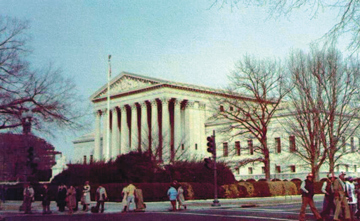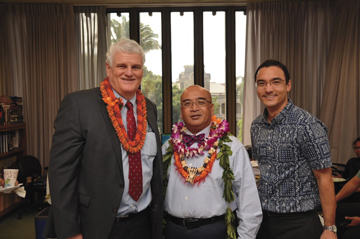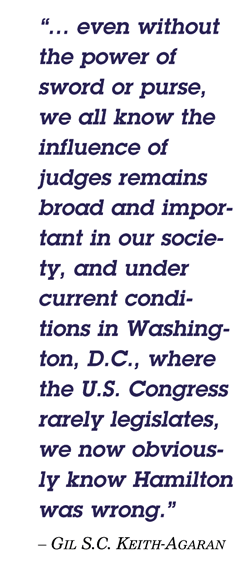
An Ascendant Conservative Judiciary Asserts Itself
Gilbert S.C. Keith-Agaran
During the Governor debates last Fall, Democratic Party nominee Dr. Josh Green, M.D. urged voters to consider the next Governor would have the ability to appoint three of the five Hawai‘i Supreme Court Justices. I don’t get a sense Green got much additional traction from making that point but the GOP nominee, a former State Judge, tried mightily to avoid talking about the unelected third branch and the impact of a more conservative Hawai‘i High Court on island life. But then again, local Republicans tend to shy away from being too closely associated with their national party and some of their party base’s priorities.
Historically, the ability to pick, and preferable pack, the Judiciary is more of a federal and national Republican drawing card. Donald J. Trump memorably released a list of possible Supreme Court Justices vetted by the Federalist Society. Whether a Supreme Court of the United States (SCOTUS) more inclined to pick away at liberal case law like Roe v. Wade swayed enough Evangelical and mainstream GOP voters to not only stay with the Republican nominee in 2016 but to actually show up at the polls is a political hack’s bar room talking point. But in an election that turned on less than 22,748 votes in Wisconsin, 44,292 in Pennsylvania and 10,794 in Michigan, every issue swaying turnout mattered.

Photo courtesy Gil Keith-Agaran
On June 28, 2023, I made online donations to my undergraduate college and law school. On the same day, SCOTUS ruled against affirmative action in college admissions, handing down 6-3 and 6-2 decisions in the consolidated cases, Students for Fair Admissions Inc v. Presidents and Fellows of Harvard College, and Students for Fair Admissions Inc v. University of North Carolina, 600 U.S. —(2023). That was just one of 58 decisions issued in the current 2022 SCOTUS Term that ended on June 30th.
Just two years before I entered college, the High Court established affirmative action as a thing in Regents of University of California v. Bakke, 438 U.S. 265 (1978). A majority of the nine Justices ruled unconstitutional a university’s use of racial “quotas” in its admissions process but allowed in some circumstances a school’s use of “affirmative action” to accept more minority applicants. Over the last forty-five years, the most selective American colleges and universities have generally applied race conscious policies in admitting an entering classes as diverse as their particular community, state or the nation as a whole.
While I don’t read every decision issued by SCOTUS, I do follow the major opinions issued annually at the end of the term.
Elections have consequences is a political truism. In the case of Hillary Clinton losing, three Justices (John Roberts, Samuel Alito and Clarence Thomas) who were on the losing end of a more recent affirmative action case (i.e., Fisher v. University of Texas at Austin, 579 U.S. (2016)), were reinforced by three Trump appointees (Neil Gorsuch, Brett Kavanaugh and Amy Coney Barrett) to form a more reliably conservative “super” majority with the potential and willingness to upend longtime legal precedents, stare decisis be damned. They displayed that sheer political strength and brawn by overruling a woman’s right to abortion last term as a start, even in the wake of a draft of the opinion leaked weeks before being announced publicly. Dobbs v. Jackson Women’s Health Organization (2022), overruling Roe v. Wade, 410 U.S. 113 (1973).

Photo: Alfredo Evangelista
The High Court Justices were also in the news this year for more than their judicial rulings. Justices Alito and Thomas were criticized for accepting travel and other gifts from Republican donors with interests in cases before the Court, with Thomas reportedly not disclosing those annual luxury trips. The head of a law firm with a thriving Supreme Court practice purchased some real estate from Justice Gorsuch that the latter had had trouble selling. The Chief Justice’s wife owns a lucrative business headhunting lawyers for major law firms. Unlike lower federal court judges subject to judicial ethical rules, SCOTUS sets, and supposedly enforces, its own standards.
In the past, other Justices have certainly accepted occasional travel, hunting trips and other gifts, including the late liberal icon Ruth Bader Ginsberg and her close frienemy Antonin Scalia. Perhaps the reverence reflexively accorded the Court by lawyers has eroded in reaction not just to recent decisions on major cases but in the sheer audacity and arrogance in the super majority abandoning incremental changes in favor of immediately implementing longtime goals for conservatives and their legal think tank and bullpen, the Federalist Society. While Chief Justice Roberts is portrayed as an institutionalist, he joined the five other conservatives in aggressively moving SCOTUS rightward. In short, critics see the Court like any other political branch with Republican appointees reliably voting as conservative activists have wanted since the Warren Court, while Democratic Justices flail at maintaining liberal precedents.
The skepticism about the Court’s motivations has turned rather ugly. Usually appellate courts only decide “actual” cases—litigation based on actual facts and real stakes and adjudicated in a final way by a lower court. Some commentators on social media and cable talking heads suggested the Court arguably took and ruled on a couple of cases that had standing or ripeness problems.
People who appeal usually need to have an injury to bring an appeal. For example, the high court easily found no standing for five of six states challenging President Joe Biden’s $400 billion loan forgiveness program. It found, however, the State of Missouri, by manufacturing an entity that participated in someway with student loan repayments and collected fees associated with those loans, did have a claim since it would lose fees from any forgiven loans to Missouri residents. The Court then used its novel “major question doctrine” to reject President Biden’s administrative order, finding a $400 billion forgiveness policy required clear authority from the U.S. Congress. Biden, President of the United States of America, et al. v. Nebraska et al., 600 U.S.—(2023). The 6–3 majority rejected whether The Higher Education Relief Opportunities for Students Act of 2003 (HEROES Act) waiver and modification authority provided the Secretary of Education and the executive branch with specific enough power to forgive student loans due to the emergency arising from the COVID-19 pandemic. The Court concluded “ ‘[t]he basic and consequential tradeoffs’ inherent in a mass debt cancellation program ‘are ones that Congress would likely have intended for itself.’ [citation omitted] In such circumstances, the Court has required the Secretary to ‘point to ‘clear congressional authorization’ ’ to justify the challenged program. [citation omitted].” As the government branch ideally independent of political concerns or emotions, the Court could coldly ignore the impact of reimposing the overwhelming financial burden for millions of Americans.
The Court also was criticized for its follow up to the Colorado Gay Wedding Cake case (Masterpiece Cakeshop v. Colorado Civil Rights Commission, 584 U.S.—(2018)). In 303 Creative LLC et al. v. Elenis et al. (June 30, 2023), SCOTUS and the lawyers for the parties, did not consider whether a religious woman opposed to same sex marriage who wanted to start a wedding website business had the right to legally challenge Colorado’s public accommodation statute. Colorado’s current Anti-Discrimination Act bars businesses open to the public (such as housing, hotels, retail businesses, restaurants and educational institutions) from denying goods or services to people because of race, gender, sexual orientation, religion and other characteristics. The Court majority created a first amendment exception from State public accommodation laws in what the majority argues is a limited category of commercial activities, like artists or businesses, create expressive content. In a dissenting opinion, Justice Sotomayor scathingly disagreed, “Today, the Court, for the first time in its history, grants a business open to the public a constitutional right to refuse to serve members of a protected class.”

Photo courtesy Gil S.C. Keith -Agaran
Twitter wags and mainstream media talking heads argued 303 Creative may now be the basis for allowing “I’m worried” standing. After the fact, journalists discovered the person who allegedly inquired about a gay wedding website was a married heterosexual who denies making the request and who himself had the skills to create his own website. Arguably, her “standing” to bring the suit fell under the pre-enforcement challenge principle—the threat Colorado would enforce its public accommodation statute allowed a court to consider her action.
As the Court’s wont, it announced those three legal “blockbuster” opinions (abolishing affirmative action, rejecting student loan forgiveness and recognizing a first amendment exemption from public accommodations) in the final week of the Term. Some cynical commentators suggest the Chief Justice and perhaps Kavanaugh and Barrett anticipated the race conscious admissions, gay wedding website and loan forgiveness decisions would be controversial and among the last released, and therefore needed some throwaway case to assure the public the Court majority was ruling on the legal merits and principles rather than following bald politics and wielding sheer power and numerical superiority. So in Allen v Milligan, 599 U.S.—(2023), Chief Justice Roberts and Justice Kavanaugh sided with their liberal colleagues to reject racially gerrymandered voting districts in Alabama. In a 5-4 ruling, the Court said that the congressional map drawn by the Alabama legislature—which established only one majority Black congressional district out of seven, in a state more than 25 percent Black—likely violated Section 2 of the Voting Rights Act.
The Supreme Court, 7-2, also surprised some observers in upholding federal requirements that Native Americans must be given preferences in the adoption or temporary fostering of Native children. Haaland, Secretary of the Interior, Et Al., v. Brackeens, 599 U.S.—(2023). The court confirmed federal standards requiring a placement “preference” for members of a child’s extended family, other tribe members or “other Indian families” under the Indian Child Welfare Act.
Roberts, Kavanaugh and Barrett joined the liberals in dismissing the inventive “Independent State Legislature” doctrine in recognizing state courts can review legislative action related to elections. Moore, in his Official Capacity as Speaker of the North Carolina House of Representatives, et al. v. Harper et al., 600 U.S.—(2023). The GOP-dominated North Carolina legislature argued the Elections Clause of the Federal Constitution requires “the Legislature” of each State to prescribe the rules governing federal elections. Art. I, §4, cl. 1. Roberts for the majority, wrote: “Marbury v. Madison, 1 Cranch 137, famously proclaimed this Court’s authority to invalidate laws that violate the Federal Constitution. But Marbury did not invent the concept of judicial review. State courts had already begun to impose restraints on state legislatures, even before the Constitutional Convention, and the practice continued to mature during the founding era. James Madison extolled judicial review as one of the key virtues of a constitutional system, and the concept of judicial review was so entrenched by the time the Court decided Marbury that Chief Justice Marshall referred to it as one of society’s ‘fundamental principles.’ Id., at 177.” Roberts concluded that the Elections Clause did not carve out an exception to that “fundamental principle” and “[w]hen state legislatures prescribe the rules concerning federal elections, they remain subject to the ordinary exercise of state judicial review.”
The Court also provided another win for free exercise of religion supporters. A unanimous court in Groff v. DeJoy, Postmaster General, (June 29, 2023) supported the ability of employees to obtain accommodations at work for religious practices, reviving a lawsuit by a former mail carrier who accused the Postal Service of discrimination after being disciplined for refusing to show up for work on Sundays.
Alexander Hamilton famously, in his anonymously published Federalist 78, argued the federal judiciary is the weakest of the three co-equal branches of the federal government. After all, we know the Judiciary has neither the guns nor a broad taxing power to enforce its orders or maintain its operations and budget. But even without the power of sword or purse, we all know the influence of judges remains broad and important in our society, and under current conditions in Washington, D.C., where the U.S. Congress rarely legislates, we now obviously know Hamilton was wrong. Without a legislative branch dealing with immigration, student loan debt, common sense gun control, environmental protection, higher education opportunities, voting rights and other important issues, the current SCOTUS is usurping that space and dictating what can or cannot happen in those areas. With life tenure, the current ascendency of the conservative SCOTUS super majority will likely last a generation.

In April, Hawai‘i Justices Michael Wilson and Paula Nakayama retired due to the Constitution’s mandatory retirement age of seventy for Justices and Judges. In Hawai‘i’s Missouri-style merit selection process, the Judicial Selection Commission (JSC) will provide Governor Green with lists to pick their successors for ten-year terms. JSC disclosed in February the thirteen lawyers and judges applying for the vacancies: District Court Judge Rebecca A. Copeland, Vladimir Devens, David M. Forman, Intermediate Court of Appeals (ICA) Chief Judge Lisa M. Ginoza, Kimberly Tsumoto Guidry, Kendra K. Kawai, Oahu District Court Judge Summer M. M. Kupau-Odo, Deirdre Marie-Iha, ICA Judge Sonja M. P. McCullen, ICA Judge Karen T. Nakasone, Oahu Circuit Court Judge Catherine H. Remigio, ICA Judge Clyde J. Wadsworth, and Thomas Yamachika. During her recent Senate confirmation as an ICA Judge, Guidry said she would withdraw from consideration. In 2024, JSC will have to provide names to the Governor to replace Chief Justice Recktenwald as well.
If confirmed by the State Senate, Green’s Justices may form a new majority on the Hawai‘i Supreme Court with the same potential to disrupt settled Hawai‘i law for at least the next decade in the same ways as the SCOTUS conservative super majority.
 Gilbert Keith-Agaran, a first generation Filipino-American, was admitted to Yale College two years after the Bakke decision and only twelve years after the admission of the first undergraduate women, and to the Boalt Hall School of Law, the University of California at Berkeley, a dozen years before California voters eliminated affirmative action. His undergraduate class was quite diverse, with students enrolled from every part of Westchester County. He received degrees from both institutions and practices law in Wailuku. He also represents Central Maui in the Hawai‘i State Senate. UH Maui College is in his Senate district.
Gilbert Keith-Agaran, a first generation Filipino-American, was admitted to Yale College two years after the Bakke decision and only twelve years after the admission of the first undergraduate women, and to the Boalt Hall School of Law, the University of California at Berkeley, a dozen years before California voters eliminated affirmative action. His undergraduate class was quite diverse, with students enrolled from every part of Westchester County. He received degrees from both institutions and practices law in Wailuku. He also represents Central Maui in the Hawai‘i State Senate. UH Maui College is in his Senate district.
